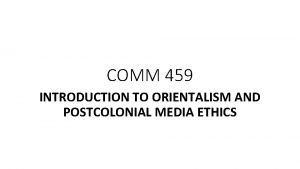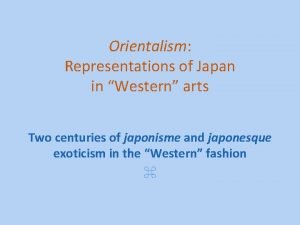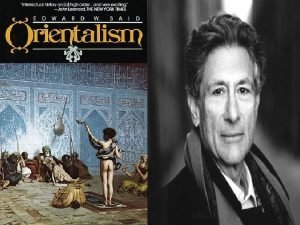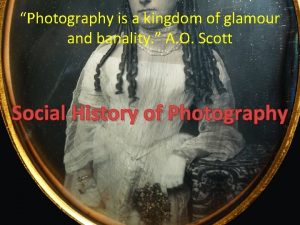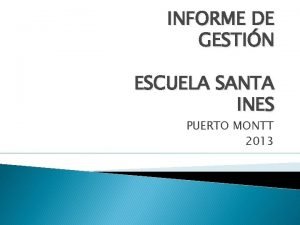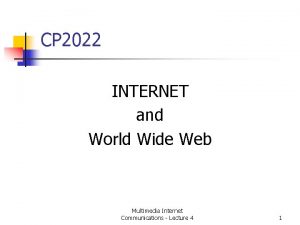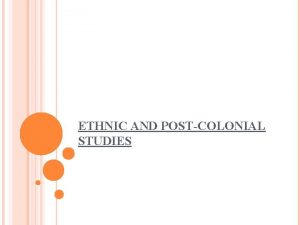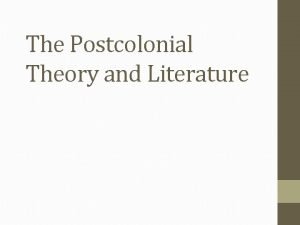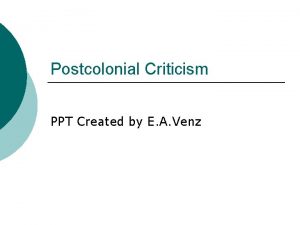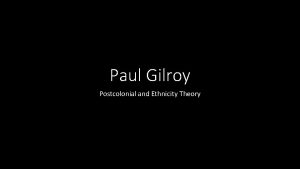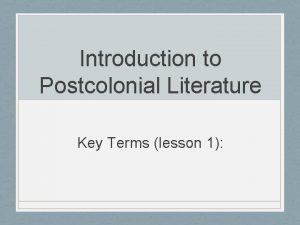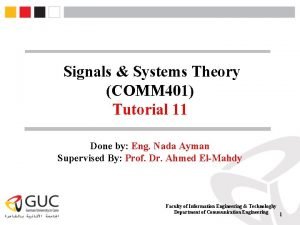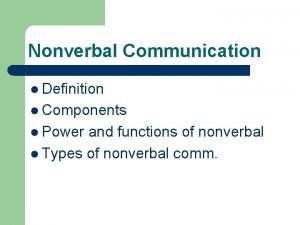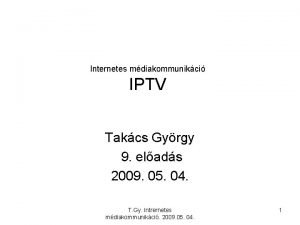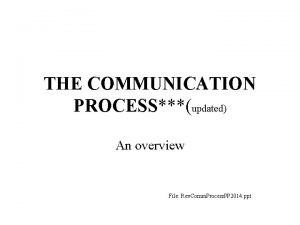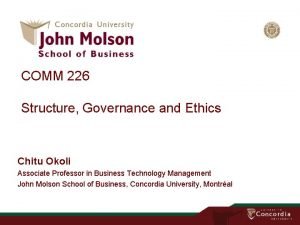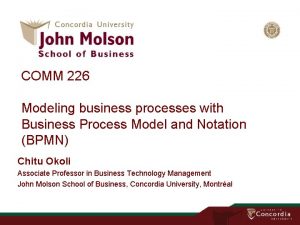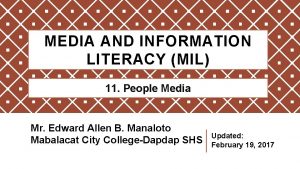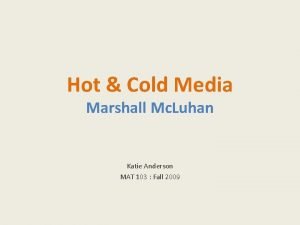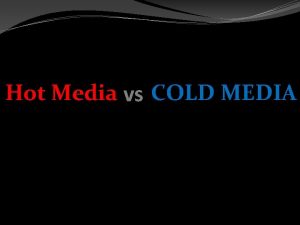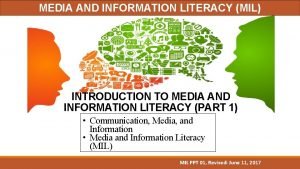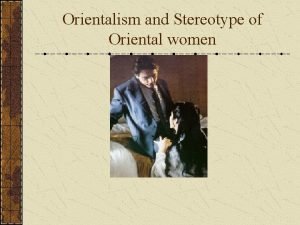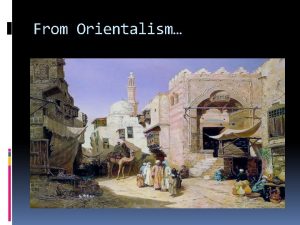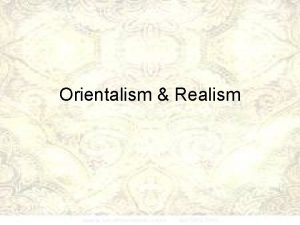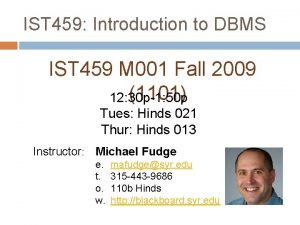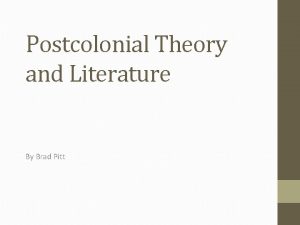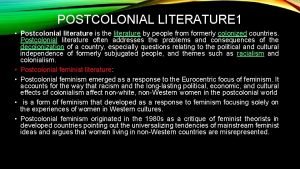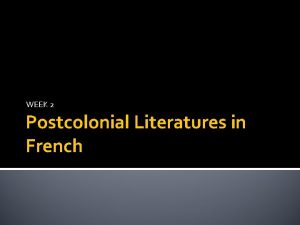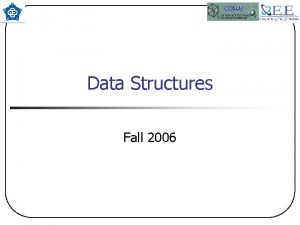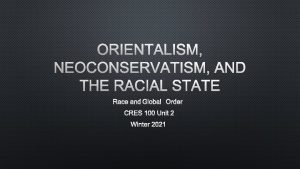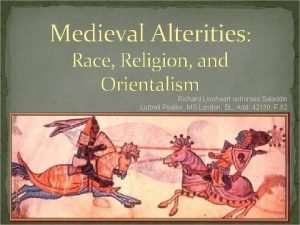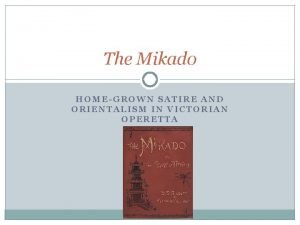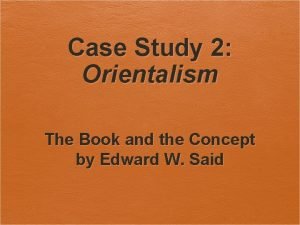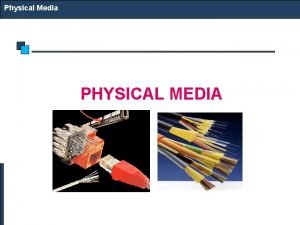COMM 459 INTRODUCTION TO ORIENTALISM AND POSTCOLONIAL MEDIA





















![Ben-Hur "Rome is the world. . . [Rest of the world] is what Rome Ben-Hur "Rome is the world. . . [Rest of the world] is what Rome](https://slidetodoc.com/presentation_image/14794fc482be259626d99ceec5fafb48/image-22.jpg)




















![Spivak: Can the Subaltern Speak? In "Can the Subaltern Speak? ", Spivak locate[s] and Spivak: Can the Subaltern Speak? In "Can the Subaltern Speak? ", Spivak locate[s] and](https://slidetodoc.com/presentation_image/14794fc482be259626d99ceec5fafb48/image-43.jpg)





- Slides: 48

COMM 459 INTRODUCTION TO ORIENTALISM AND POSTCOLONIAL MEDIA ETHICS

Edward Said (1935 -2003) and Orientalism

Edward Said Born in Palestine, a refugee in Egypt after the loss of Palestine in 1947, and then a migrant to the United States, Said spent most of his life as an exile from his homeland, having a deep sense of belonging to a dispossessed culture. Living under a deluge of racist outrage in the US, with right-wing conservative Americans burning down his office, Said learnt to cope with opposition and write on the prevailing atmosphere of injustice. Shelley Walia. Said and Writing History. P. 5, 6.

Edward Said The intellectual journeys of Edward W. Said, a leading literary critic and a forthright spokesman of human rights, took him around the world and across many disciplines, contributing substantially to the shaping of contemporary debates on Orientalism, discourse analysis, dissident politics and post-colonialism. Shelley Walia. Said and Writing History. P. 3.

1. What makes colonialism work? ORIENTALISM According to Edward Said: Orientalism was ultimately a political vision of reality whose structure promoted the [binary] difference between the familiar (Europe, West, "us") and the strange (the Orient, the East, "them")”. Edward Said. Orientalism, 43.

ORIENTALISM • Orientalism and colonial mind-set rest heavily on binary oppositions. Such oppositions never fit together. Self vs. Other Colonizer vs. Colonized Modern vs. Backward First World vs. Third World West (occident) vs. East (Orient) White vs. Black Civilized vs. Barbarian

ORIENTALISM Orientalism is fundamentally a political doctrine willed over the Orient because the Orient was weaker than the West, which elided the Orient’s difference with its weakness (. . . ) As a cultural apparatus Orientalism is all (. . . ) activity, judgment, will-to-truth, and knowledge". Edward Said. Orientalism. 1981 a: p. 204

Yet another famous Orientalist. Arminius Vambery. Eminent 19 th century Hungarian traveler.

2. What Makes Orientalism Work? ESSENTIALISM Essentialism means “circumstances may change. . . but there’s a core of human experience that remains essentially the same. ” Škvorecky So East is always East and West is always West. For instance: According to orientalist stereotypes, the Eastern is «foolish» , «barbarous» , and «retrograde» . The Western is just the opposite.

Rudyard Kipling. The Prophet of British Imperialism ‘OH, East is East, and West is West, and never the twain shall meet’. The Ballad of East and West. It means the two are essentially different and cannot be same and one.

Jacques Derrida (1930 -2004) Jacques Derrida … will be remembered as one of the three most important philosophers of the 20 th century. No thinker in the last 100 years had a greater impact than he did on people in more fields and different disciplines. And no thinker has been more deeply misunderstood. . . Most of his infamously demanding texts consist of careful interpretations of canonical writers in the Western philosophical, literary and artistic traditions—from Plato to Joyce. . . He showed how these repressive structures, which grew directly out of the Western intellectual and cultural tradition, threatened to return with devastating consequences. Mark C. Taylor. What Derrida Really Meant. Retrieved from http: //www. press. uchicago. edu/books/derrida/taylorderrida. h tml

3. What Makes Colonialism Work? White Mythology: Hierarchy Triumphs «Metaphysics – the white mythology which reassembles and reflects the culture of the West: the white man takes his own mythology, Indo-European mythology, his own logos, that is the mythos of his idiom, for the universal form of that he must still wish to call Reason. » Derrida. Margins of Philosophy. 1982. p. 213 In Sum, white mythology consolidates the opinion that Western knowledge is "the unquestioned and dominant centre of the world» (Robert J. C. Young, White Mythologies. P. 51) White mythology believes in «the hierarchical dualism of ‘West’» and ‘East’ to the favour of the West (Robert J. C. Young, White Mythologies. 181). Because, «the British saw the world as a hierarchy of peoples, with themselves as the divinely ordained upper crust» John Spurling. 1982. The British Empire. p. xix.

What Makes orientalism and colonial discourse work? The “Western Europe” is believed to be “supreme” over the non-European cultures. Why European and Western cultures are the unquestioned and dominant center of the world? The idea of modernity is foundational to «Western Supremacist» positions. Modernity is «the period following the mid eighteenth century European Enligtenment, which is charachterized by the combination of secularization, rationalization, democraticization, individualism and the rise of scientific thinking» . Anthony Giddens, Sociology, 2009: p. 1125. The answer is simple: the imaginings and concept of modernist narratives. What is modernist thinking? It is not modernity. In the light of the postcolonial view, nonwestern cultures are connected with the «inevitable» development which is conditioned by the modernist future progress where, “every society is condemned to enter into that history and pass through the stages which lead from savagery to civilization”. Pierre Clastres, Society against the State 1989: 190.

What Makes orientalism and colonial discourse work? The “Western Europe” is believed to be “supreme” over the non-European cultures. Why European and Western cultures are the unquestioned and dominant center of the world? «Western society of the last two or three centuries believes itself superior to earlier societies or 'more primitive' contemporary ones. . By this term, Western society seeks to describe what constitutes its special character and what it is proud of: he level of its technology, the nature of its manners the development of its scientific knowledge or view of the world, and much more» . Norbert Elias. The Civilizing Process. 2000. P. 5.

What Makes orientalism and colonial discourse work? The “Western Europe” is believed to be “supreme” over the non-European cultures. Why European and Western cultures are the unquestioned and dominant center of the world? • In a nutshell, as British sociologist Giddens puts it, «people in modern Western nations have come to understand their societies as setting the standard for civilized conduct and therefore, as being superior other types of societies» because of their widespread «modern» technology and adwanced science. Anthony Giddens, Sociology, 2009: p. 1037.

Orientalism, Media and Discursive Control There has been a reinforcement of the stereotypes by which the Orient is viewed. Television, the films, and all the media's resources have forced information into more and more standardized molds. Edward Said. Orientalism, P. 26. The language here that the western media employs is the language of the “European who can discursively control” (Said, 1981, 162)

Orientalism, Media and Economical Control In addition to the dominance of capital, in the case of “the capital accumulation in the North, which compromises North America, Western Europe and Japan, reached saturation point, making further spatial expansion and capitalism necessary and (. . . ) the colonization and other imperial programmes have already made the south ddependent on the North. ” Bhuiyan, Peripheral View: Conceptualizing the Information Society as a Postcolonial Subject. 2008: 113. When the western discursive language asserts itself and brings out the structural insufficiencies of the East to represent itself, the latter becomes dependent on the textual and structural decision making of Western capitalism because, “Southern countries do not have much choice but to be complicit with the [information society ] project since it is new imperial project. Southern countries were ruthlessly exploited during colonial rule. Bhuiyan, 2008: p. 110

Edward Said. Culture & Imperialism «The main battle in imperialism is over land, of course; but when it came to who owned the land, who had the right to settle and work on it, who kept it going, who won it back, and who now plans its future--these issues were reflected, contested, and even for a time decided in narrative. As one critic has suggested, nations themselves are narrations. The power to narrate, or to block other narratives from forming and emerging, is very important to culture and imperialism, and constitutes one of the main connections between them» . 1994. P. xii-xiii

Culture and Imperialism One significant contemporary debate about the residue of imperialism the matter of how "natives" are represented in the Western media-illustrates the persistence of such interdependence and overlapping. Edward Said, p. 21.

Historic Discourse The imaginary binarism (division between the East and the West) has long historical roots. It is not a recent innovation. As Said puts: «To be a European or an American in such a situation is by no means an inert fact. It meant and means being aware, however dimly, that one belongs to a power with definite interests in the Orient, and more important, 'hat one belongs to a part of the earth with a definite history of involvement in the Orient almost since the time of Homer» . Edward Said, Orientalism. P. 11.

This line of thinking (in popular media) is very historic and old. Ridley Scott’s Gladiator (2000). Marcus Aurelius: And, what is Rome, Maximus? Maximus: I have seen much of the rest of the world. It is brutal, cruel and dark. Rome is the light.
![BenHur Rome is the world Rest of the world is what Rome Ben-Hur "Rome is the world. . . [Rest of the world] is what Rome](https://slidetodoc.com/presentation_image/14794fc482be259626d99ceec5fafb48/image-22.jpg)
Ben-Hur "Rome is the world. . . [Rest of the world] is what Rome wills. " From Ben-Hur: A Tale of the Christ, by Lew Wallace.

Cultural Imperialism The phrase "cultural imperialism, " made current and even fashionable by Jacques Lang, loses some of its meaning when applied to the presence of television serials like Dynasty and. Dallas in, say France or Japan, but becomes pertinent again when viewed in a global perspective. Said, Culture and Imperialism. 1994: p. 291.

British Imperial Culture in 1980 s Media (Imperial Revival) • Thicha • Heat & Dust • Passage to India • Jewel in the Crown • The Far Pavillions • Out of Africa • Gandhi (1982) • Vanishing Africa

British Imperial Culture in 1980 s Media (Imperial Revival) • Our War (2011) • In Which We Serve (1942) • Out of Africa (1985) • Yasmin (2005) • Amazing Grace (2006)


Movie and Literature • • • • Apted, Michael (dir. ), Amazing grace (2006) Carey, Peter, True history of the Kelly gang (London, 2000) Clegg, Tom (dir. ), Sharpe’s challenge (2006) -, (dir. ), Sharpe’s peril (2008) Ondaatje, Michael. The English Patient. (London, 1993) Ferry, John, After Omdurman (London, 2008) Grant, Richard E. (dir. ), Wah-Wah (2005) Minghella, Anthony. (dir. ), The English Patient (1996) Jordan, Gregor (dir. ), Ned Kelly (2003) Kapur, Shekhar (dir. ), The four feathers (2002) Loach, Ken (dir. ), The wind that shakes the barley (2006) Mac. Donald Fraser, George, Flashman on the march (London, 2005) Meadows, Shane (dir. ), This is England (2006)

Orientalism and Stereotypes Both the electronic and print media have been awash with demeaning stereotypes that lump together Islam and terrorism, or Arabs and violence, or the Orient and tyranny. Edward Said. Orientalism, 347.

Orientalism. The «East» is Weak. David Hirst writes, Palestinians are "doomed, through their own shortcomings as well as their enemy's superiority, always to lose, and subconsciously seem to know it ". Wadie E. Said. «Afterword» . In From Oslo to Iraq and the Road Map: Essays. By Edward W. Said. Page 300. David Hirst. The Gun and the Olive Branch: The Roots of Violence in the Middle East. 3 rd ed. New York: Nation Books. p. 201

Keep a closer eye on what happens. The central argument of the below news coverage is that the BBC conspicuously humanizes deaths in Israeli side in terms of representations more than they do with “eastern” Palestinian side at least when it comes to the initial response to the intercommunal killings.

Post. Colonial (Neocolonial) Media Ethics Postcolonialism is only part of the story. It could have been put into following words: «The colonial mentality continues to be responsible for this situation not to forget the role of self-centered and cynical leaders who would rather fill their pockets than protect the interests of the people» . Prakash Kona

Postcolonial Media Ethics. Did the Empire really end? Is there an after-life following decolonization/independence? «Colonialism does not end when the former colonial power goes away. It takes a much longer time for the mind to free itself from age -old habits which include lack of selfhood or trust in oneself as individuals capable of making choices that can determine both one’s own fate and that of the nation» . Prakash Kona

Global Migrations, Diaspora and Global Terror. After Effects of Colonialism and Imperialism

Postcolonial Media Ethics: Why do we need Postcolonial Theory (PCT)? • Colonial situation cannot be avoided in the post -colony. • A lot of students are from formerly colonized countries. • Some of us might be a future media professional in the post-colony.

The Ethical Imperatives of the Media: How Should Media Professionals Work in the Postcolony in Ethical Context? In the postcolony, the ethical value of human dignity is universal and non-negotiable ethical code for media professionals. Lives are sacred. Remember Sir Isaiah Berlin: Everything is what it is: liberty is liberty, not equality or fairness or justice or culture, or human happiness or a quiet conscience. If the liberty of myself or my class or nation depends on the misery of a number of other human beings, the system which promotes this is unjust and immoral. P. 5. Berlin, I. (1958) “Two Concepts of Liberty. ” In Isaiah Berlin (1969) Four Essays on Liberty. Oxford: Oxford University Press.

Features of Postcolonial Theory (PCT). Herman Wasserman. • Before anything else, postcolonial criticism is an inherently ethical enterprise. Because it seeks to speak to western paradigms in the voice of otherness. • PCT tackles on colonial and postcolonial discourses. • PCT cracks on postcolonial and mainstream media. • PCT argues against forms of ethnocentrism and familiar routines of everyday life. • PCT is a critical and interventionist approach. PCT thinks criticly about the colonial empire. It intervenes and criticizes power structures, culture and knowledge in the postcolonial setting. • It is a useful multi-disciplinary approach. Therefore it draws on linguistics, sociology, politics, literature, media studies, anthropology. • In reveals hidden assumptions in the postcolony. • PCT concerns with Hybridity. As Bhabha says Postcolonial venue is a hybrid setting • It «goes native» . Based on the principle of learning from people rather than studying people. People are not objects. • Postcolonial criticism becomes a rebellion against the negation of human dignity.

How Should Media Professionals Work in the Postcolony in Ethical Context? Herman Wasserman. • Media professionals must amend the colonial wounds and injustices. • Media professionals must respect the otherness of the different cultures. • Media professionals must avoid homogenizing, assimilating language and narratives.

How Should Media Professionals Work in the Postcolony in Ethical Context? Herman Wasserman Media professionals must be attentive to new forms of Global domination (neocolonial) or ongoing exploitation.

Post. Colonial Media Ethics

Celebrity Colonialism Hunting Safari in Africa and celebrity shows in Africa set solid example for Celebrity Colonialism ( «benevolent paternalist» Celebrities) in the postcolonial venue. They are colonial connection after decolonization. Nostalgia for the colonial times and romanticization of Africa become popular in media. (Film: Vanishing Africa).

Celebrity Colonialism For further reading, please dip into the following text: Riggs, Damien W. , ‘Poppadoms, Princesses and Privilege: (Neo)Colonial Racism in the Celebrity Big Brother Household’, in Robert Clarke (ed. ), Celebrity Colonialism: Fame, Power and Representation in Colonial and Postcolonial Cultures (2009)

Subaltern In postcolonial theory, subaltern is a term that commonly refers to persons who are socially, politically, and geographically outside of the hegemonic power structure. Of a lower rank or position; inferior or secondary people in the hierarchy. The term is developed by Spivak.
![Spivak Can the Subaltern Speak In Can the Subaltern Speak Spivak locates and Spivak: Can the Subaltern Speak? In "Can the Subaltern Speak? ", Spivak locate[s] and](https://slidetodoc.com/presentation_image/14794fc482be259626d99ceec5fafb48/image-43.jpg)
Spivak: Can the Subaltern Speak? In "Can the Subaltern Speak? ", Spivak locate[s] and re-establish[s] a "voice" or collective locus of agency in postcolonial India. Although Spivak acknowledges the "epistemic violence" done upon Indian subalterns, she suggests that any attempt from the outside to ameliorate their condition by granting them collective speech. Benjamin Graves. 1998, Brown University.

Propaganda model of Chomsky and Hermann: Worthy Victims vs. Unworthy Victims Chomsky and Herman is quite helpful here. The exclusion of the less recognized eastern (formerly colonized subjects or scapegoats) people from the public sphere and inclusion of western subjects. The propaganda analysis of the Chomsky and Herman comes directly within the worthy and unworthy binary. Westerners are worthy (newsworthy) while non-westerners are unworthy (not newsworthy). As Chomsky and Hermann, says that «Our hypothesis is that worthy victims will be featured prominently and dramatically, that they will be humanized, and that their victimization will receive the detail and context in story construction that will generate reader interest and sympathetic emotion. In contrast, unworthy victims will merit only slight detail, minimal humanization, and little context that will excite and enrage» . Manufacturing Consent, 1988: p. 35.

Postcolonial people are «Unpeople» John Pilger coined a powerful term «unpeople» . By «unpeople» , (like Spivak’s subaltern or Chomsky and Hermann’s «Unworthy Victims» ), Pilger means mariginalized And muted people of the Postcolony.

John Pilger and Unpeople in the Postcolony • The word «unpeople» refers to millions of people in poor countries who are marginalized or entirely absent from media coverage. Because these people are a faceless mass, it's easy for western governments to wage war against them. After all, if electorates can't imagine that there are real people suffering the consequences of war, they are less likely to protest. • Owen Jones. Sunday 20 March 2011. Unpeople? We used to call them working-class. The Guardian. Retrieved from http: //www. theguardian. com/commentisfree/2011/mar/20/unpeopl e-working-class-media-labour

How Should Media Professionals Work in the Postcolony in Ethical Context? Herman Wasserman • The duty of a media professional, then, is to give a voice to silenced subaltern/unpeople, those who remain on the marigins. ‘A postcolonial ethic concerned with human dignity as a central value would be about mechanicisms, routines and norms that continue to exclude or obscure the fate of historically mariginalized groups from the mediated public sphere’. Remember that ethics are about self and other relationship. Just act on the following practical applications of the ethical issues: • Be fair when covering. • Avoid being one-sided and give equal access to all sides during covering. • Wide-ranging coverage. • No discrimination in covering. • Warning against picking up terrorist and racist language. • Nihil humanum alienum a me: "nothing human is foreign to me. "

The END
 Introduction to orientalism
Introduction to orientalism Japanese orientalism
Japanese orientalism Said definition of orientalism
Said definition of orientalism Clematis stem
Clematis stem Latent orientalism
Latent orientalism Escuela santa ines puerto montt
Escuela santa ines puerto montt 459-393-385
459-393-385 Ethnicity in postcolonialism
Ethnicity in postcolonialism Postcolonial theory in literature
Postcolonial theory in literature Postcolonial literature ppt
Postcolonial literature ppt Paul gilroy postcolonial theory
Paul gilroy postcolonial theory Postcolonial key terms
Postcolonial key terms Neocolonialism
Neocolonialism Proper comm
Proper comm Joinmyquiz.comm
Joinmyquiz.comm When to use a comm
When to use a comm Komunikasi personal
Komunikasi personal Intrapersonal comm
Intrapersonal comm Roborio comm light red
Roborio comm light red Defsoc
Defsoc Comm 401
Comm 401 Mobilecric.comm
Mobilecric.comm Rodney davis fresno state
Rodney davis fresno state O.comm
O.comm Netbenefits.comm
Netbenefits.comm Comm 486
Comm 486 Aug comm device
Aug comm device Www.menti.com
Www.menti.com Comm'l meaning
Comm'l meaning Net comm wireless
Net comm wireless Beeg comm
Beeg comm Www.menti.com
Www.menti.com Dig
Dig Rev.comm
Rev.comm Wwwmenti..com
Wwwmenti..com Www.mentii.com
Www.mentii.com Comm portal
Comm portal Www.menti com
Www.menti com Www.menti.cin
Www.menti.cin Comm operator
Comm operator Comm operator
Comm operator Comm 226 quiz 1
Comm 226 quiz 1 Comm 226
Comm 226 What is a characteristic of people media
What is a characteristic of people media Hot and cold medium
Hot and cold medium Hot media and cold media
Hot media and cold media Benefits of transferring data over a wired network
Benefits of transferring data over a wired network Luhan hot
Luhan hot 3 basic components of media and information literacy
3 basic components of media and information literacy
